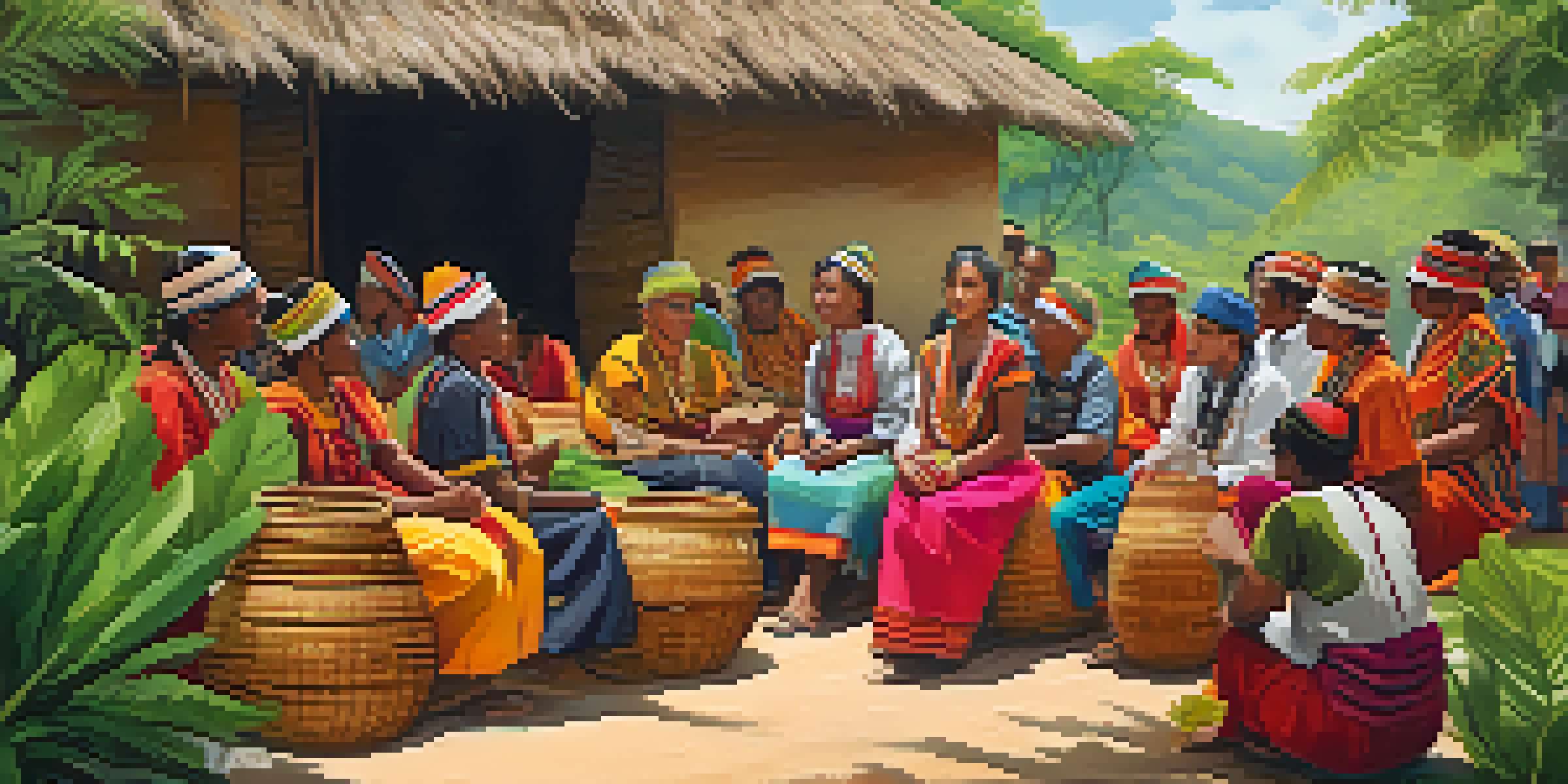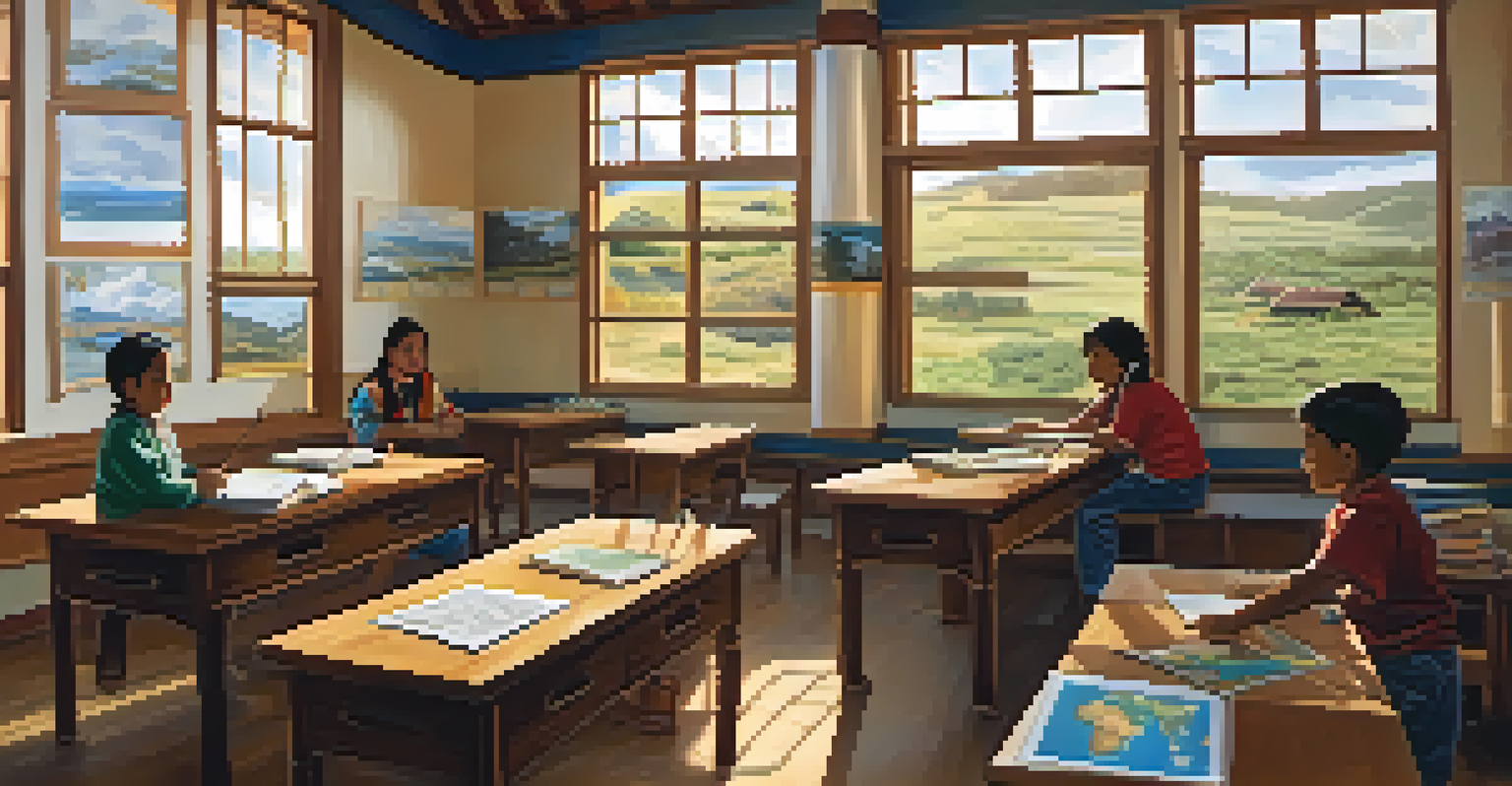Engaging with Indigenous Communities Through Volunteer Work

Understanding Indigenous Communities and Their Needs
Indigenous communities are rich in culture and history, often facing unique challenges. Understanding their needs requires an open mind and a willingness to learn. Each community has its own customs, languages, and traditions that shape their identity.
When we listen to the stories of Indigenous peoples, we honor their struggles and their resilience.
Engaging with these communities begins with acknowledging their sovereignty and the historical context of their struggles. It's essential to approach them with respect and a genuine desire to contribute positively. Listening to their stories can unveil the layers of their experiences and aspirations.
To effectively support Indigenous communities, volunteers should research and understand their specific circumstances. This knowledge will guide your efforts and help avoid unintentionally perpetuating stereotypes or misconceptions. Building this foundational understanding sets the stage for meaningful engagement.
The Importance of Building Trust and Relationships
Trust is the cornerstone of any effective volunteer effort, especially with Indigenous communities. Many have experienced broken promises and exploitation, making it crucial for volunteers to approach with sincerity and integrity. Building relationships takes time and requires consistent effort.

One way to foster trust is by showing up and being present in the community. Participating in local events, attending meetings, and simply getting to know the people can make a significant difference. When community members see your commitment, they are more likely to welcome you into their world.
Understanding Indigenous Needs
Engaging with Indigenous communities requires respect, active listening, and a commitment to understanding their unique cultures and challenges.
Additionally, bringing along cultural sensitivity and humility as you engage will enhance your relationships. It’s about mutual respect and understanding, rather than assuming you know what’s best for the community. Taking the time to listen and learn strengthens the bonds you create.
Identifying Volunteer Opportunities with Impact
Finding the right volunteer opportunities can feel like searching for a needle in a haystack. However, focusing on initiatives that align with the community's needs and values is key. Whether it’s education, health, or environmental conservation, your passion can guide you.
The most important thing in communication is hearing what isn't said.
Start by connecting with local Indigenous organizations or leaders who can provide insight into where your skills and interests might fit. This collaboration ensures that your efforts are relevant and appreciated. It’s about working together, not stepping in with preconceived notions of how to help.
Consider engaging in projects that empower rather than impose. For example, teaching skills that enhance self-sufficiency or supporting cultural activities can foster growth within the community. Such approaches create lasting impacts and respect the community's autonomy.
Cultural Sensitivity: The Heart of Volunteer Work
Cultural sensitivity is not just a buzzword; it’s an essential aspect of volunteering with Indigenous communities. Every culture has its own nuances, and being aware of them can prevent misunderstandings that might hinder your efforts. This sensitivity shows respect for their way of life.
For instance, certain gestures or phrases that are commonplace in one culture may carry different meanings in another. Taking the time to learn about these differences can avoid unintentional offense. It’s all about being aware and adjusting your actions accordingly.
Building Trust Through Presence
Establishing strong relationships with Indigenous communities hinges on trust, which is cultivated through consistent engagement and cultural sensitivity.
Engaging in cultural activities, such as storytelling or traditional crafts, can deepen your understanding and appreciation of Indigenous cultures. These experiences not only enrich your journey but also demonstrate your willingness to embrace their heritage. It’s a beautiful exchange that benefits everyone involved.
The Role of Education in Community Engagement
Education plays a pivotal role in empowering Indigenous communities. Volunteers can support educational initiatives that promote cultural knowledge and academic success. This dual focus helps preserve traditions while providing the skills needed for modern challenges.
By volunteering in schools or tutoring programs, you can help bridge gaps in education that some communities face. It’s an opportunity to share knowledge and resources that can uplift students and foster a love for learning. Remember, education is a two-way street; you’ll learn as much as you teach.
Encouraging Indigenous youth to embrace their identity through education can build confidence and pride. Supporting initiatives that celebrate their culture, such as language revitalization programs, can make a lasting impact on future generations. It’s about creating a brighter, more inclusive future.
Listening and Learning: Key to Sustainable Engagement
Active listening is a vital skill when engaging with Indigenous communities. It allows volunteers to understand the community's perspectives and priorities. Rather than assuming what they need, take the time to hear their voices and stories.
Participating in community meetings and discussions can offer valuable insights into their aspirations and concerns. This knowledge can help you tailor your volunteer efforts in a way that aligns with their goals. It emphasizes the importance of collaboration over assumption.
Empowering Through Education
Volunteers can make a significant impact by supporting educational initiatives that promote both cultural knowledge and academic success in Indigenous communities.
Sustainable engagement means being adaptable and responsive to the community's evolving needs. As you listen and learn, be prepared to shift your approach based on their feedback. This flexibility fosters a sense of partnership and respect.
Celebrating Achievements and Progress Together
Celebration is an essential part of community engagement, marking milestones and achievements. Whether it’s completing a project or recognizing cultural events, sharing in these moments strengthens your connection with the community. It shows that you value their successes.
Organizing or participating in community events can create a festive atmosphere that fosters unity. These gatherings are opportunities to reflect on the journey together and acknowledge the hard work put in by everyone involved. It’s a chance for both volunteers and community members to share their stories.

Moreover, celebrating achievements can inspire continued collaboration. Recognizing the progress made encourages everyone to keep moving forward together. It’s these moments of joy and togetherness that create lasting memories and friendships.
Reflecting on Your Experience and Growth
Volunteering with Indigenous communities is not just about giving back; it’s also an opportunity for personal growth. Reflecting on your experiences can help you appreciate the lessons learned and the relationships built. This introspection can lead to a deeper understanding of your role in the community.
After your volunteer work, take some time to journal or discuss your journey with others. What challenges did you face? What moments touched your heart? These reflections can enhance your future engagements and inform your understanding of Indigenous issues.
Ultimately, your growth as a volunteer can ripple out into your wider community. By sharing your experiences and insights, you can inspire others to engage meaningfully with Indigenous communities. It’s about creating a cycle of understanding and respect that benefits everyone.